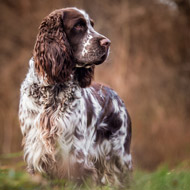
Gundogs identified as more at risk than terriers
New research has shed light on which breed groups and breeds are most at risk of contracting Alabama rot.
The RVC study found that gun dogs and hounds are nine to 10 times more likely to contract the disease, also known as cutaneous and renal glomerular vasculopathy (CRGV), than terriers. Other risk factors such as sex and neuter status were also identified.
Researchers hope the findings will help vets develop a more reliable index of suspicion for the disease. It is also hoped that the study will aid the development of causal models for CRVG and play a part in identifying its cause.
“As an emergent disease, we do not know if Alabama Rot will go on to pose a large welfare risk to the UK dog population in the future,” said researcher and co-author Dr Dan O’Neill. “But exploring the distribution and causes of this unusual disorder is exactly the type of research question the VetCompass is now equipped to help answer’."
Using data from the RVC’s VetCompass Programme, the study included 101 CRGV cases and some 450,000 dogs under primary veterinary care in the UK. It’s key finding were:
• the odds of gundogs and hounds being a CRGV case was between 9 and 11 times that of terriers.
• pastoral dogs were significantly more likely to have CRGV than terriers
• there were no toy dogs among CRGV cases
• breeds with increased odds of being a CRGV case compared with crossbreds included the flat-coated retriever, Hungarian vizsla, Manchester terrier, saluki, whippet, English springer spaniel and bearded collie
• breeds with decreased odds of being a CRGV case compared with crossbreds were the Staffordshire bull terrier, German shepherd dog and Jack Russell terrier
• female dogs had 1.49 times the odds of CRGV of male dogs
• neutered dogs had 3.36 times the odds of CRGV of entire dogs
• age was not a significant risk factor for CRGV.
CRGV is a very rare condition of an unknown cause that damages blood vessels in a dog's skin and kidneys. This leads to ulcers on the skin and, if not spotted early enough, can cause sudden and fatal kidney failure.
The disease was first reported in the UK in 2012 and researchers have since been working to ascertain its cause and develop effective treatment strategies.
The study, Signalment risk factors for cutaneious and renal glomerular vasculopathy in dogs in the UK, is published in Vet Record.



 The Animal and Plant Health Agency (APHA) has updated its online reporting service for dead wild birds.
The Animal and Plant Health Agency (APHA) has updated its online reporting service for dead wild birds.